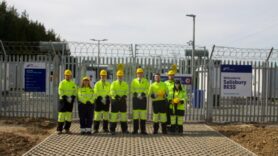Innovations for a more sustainable New Year
Sustainability was once the watchword of the environmentally aware – now it’s an everyday term embraced by anyone and everyone in business. Throughout 2013, it’s been a key focus of my blogs, especially the sustainability of two of our most precious resources – energy and water. Food, of course, is also crucial. So I thought I’d kick off 2014 by sharing some of the sustainability-related innovations and developments that have caught my eye in these areas.
As energy is my business, let’s start with that. There’s no disputing that the cost of oil and gas will keep rising, so it makes sense to look at sustainable alternatives. Transforming waste into energy is an ideal solution to two problems. So a new technology which aims to convert problematic habitats into clean energy sounds like a great win/win approach.
Integrated Generation of Solid Fuel and Biogas from Biomass – or IFBB for short – can transform plant material previously unsuitable as a biomass source into energy, and is currently being trialled by the National Trust in Wales. This German-developed technique takes plants such as gorse, bracken and soft rush, which are also unsuitable for animal feed, and removes the problematic mineral content before pressing for use as fuel. The unique pre-treatment process also reduces carbon emissions and ash content.
As well as Wales, trials are taking place in Germany, Belgium and in France, where roadside verges are being tested for their potential to be turned into fuel pellets or briquettes. The results are then due to be evaluated in the Spring. If successful, IFBB could provide a solution to the conflict that exists between bio-energy and food production, while also creating more efficient energy supply chains.
Is the water solution underground?
Next up, water. For me, the biggest story concerning this most vital of resources is the discovery, last September, of vast underground water stores in Kenya, where more than 17 million people currently lack access to safe drinking water. Thanks to an innovative mapping system called WATEX, scientists have uncovered the existence of a huge aquifer 1000 feet below the surface. It’s believed to hold 900% more water than Kenya’s current reserves – enough, some estimate, to meet the entire country’s water needs for the next 70 years and help to fast-forward the nation’s development.
WATEX combines radar technology with existing satellite and geological maps to see what’s underneath the ground. UNESCO is hoping to use this breakthrough approach to find water in other African countries.
As well as water shortages in the developing world, food is another key resource that’s often sadly lacking. Meanwhile, our Western approach to food production and consumption is clearly unsustainable. Take meat as an example. According to the United Nation’s Food and Agriculture Organisation (UNFAO), an estimated 30% of the earth’s ice-free land is already directly or indirectly involved in livestock production. And it’s not just a question of space. The UNFAO also estimates that livestock production generates nearly a fifth of the world’s greenhouse gases — more than transportation.
A new source of sustenance
Finding a solution to meeting the world’s food needs is therefore a challenge. So a new start-up promising a far more sustainable protein source, that’s also nutrient rich and lower in fat, caught my attention recently.
London-based Ento is working towards – brace yourself – “getting people to eat insects one delicious bite at a time”. This unconventional but nevertheless abundant source of protein can, apparently, be delicious and exciting. I have to say the dishes displayed on their website do look tasty as well as attractive (although, you’d be hard pressed to identify any insect matter as it looks carefully processed into trendy sushi-like bites). But I’m certainly intrigued – check them out at eat-ento.co.uk.
I’m also interested to hear from you, if you spot any sustainability innovations or have anything else you’d like to share. But for now, here’s to a New Year that brings yet more solutions to the many challenges around resource sustainability that we all face. Happy 2014!





